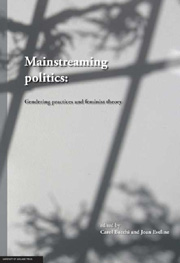Book contents
- Frontmatter
- Contents
- Preface
- Personal reflection
- Publisher's note
- List of authors and project personnel
- Acknowledgements
- Introduction
- 1 Gender/ing impact assessment: Can it be made to work?
- 2 Mainstreaming and neoliberalism: A contested relationship
- 3 Gender analysis and social change: Testing the water
- 4 What are we mainstreaming when we mainstream gender?
- 5 Approaches to gender mainstreaming: What's the problem represented to be?
- 6 Power, resistance and reflexive practice
- 7 Gender mainstreaming: The answer to the gender pay gap?
- 8 Gender analysis and community participation: The role of women's policy units
- 9 The invisibility of gendered power relations in domestic violence policy
- 10 Gender mainstreaming versus diversity mainstreaming: Methodology as emancipatory politics
- 11 University-public sector research collaboration: Mine the space, never mind the gap
- 12 Obeying organisational ‘rules of relevance’: Gender analysis of policy
- 13 Gender mainstreaming or diversity mainstreaming? The politics of ‘doing’
- Conclusion A politics of movement
- Author Index
- General Index
8 - Gender analysis and community participation: The role of women's policy units
Published online by Cambridge University Press: 05 June 2012
- Frontmatter
- Contents
- Preface
- Personal reflection
- Publisher's note
- List of authors and project personnel
- Acknowledgements
- Introduction
- 1 Gender/ing impact assessment: Can it be made to work?
- 2 Mainstreaming and neoliberalism: A contested relationship
- 3 Gender analysis and social change: Testing the water
- 4 What are we mainstreaming when we mainstream gender?
- 5 Approaches to gender mainstreaming: What's the problem represented to be?
- 6 Power, resistance and reflexive practice
- 7 Gender mainstreaming: The answer to the gender pay gap?
- 8 Gender analysis and community participation: The role of women's policy units
- 9 The invisibility of gendered power relations in domestic violence policy
- 10 Gender mainstreaming versus diversity mainstreaming: Methodology as emancipatory politics
- 11 University-public sector research collaboration: Mine the space, never mind the gap
- 12 Obeying organisational ‘rules of relevance’: Gender analysis of policy
- 13 Gender mainstreaming or diversity mainstreaming? The politics of ‘doing’
- Conclusion A politics of movement
- Author Index
- General Index
Summary
Introduction: Carol Bacchi and Joan Eveline
In Chapter 5 we identify the ‘project trap’ – subservience to wider policy objectives – as a major constraint on potentially transformative gender analysis processes. There we show, for example, how privatisation of health care (Armstrong 2002) increases the caring work that those marked as ‘women’ will have to do, reinforcing the conventional domestic division of labour. It follows that, in order to be transformative, a gender analysis must be able to scrutinise underlying premises in policy proposals, showing how they can be gendering practices that produce gendered beings and gendered relationships.
A major factor deterring critical analysis of this type is the insider status of those performing gender analysis, since policy workers are obliged to an extent to perform assessment tasks as laid out by the government holding office (Chapter 11). To loosen the ties of this limiting ‘insider’ status and hence to enable policy workers to become more critical of government policies, some theorists emphasise the importance of forms of community involvement as a policy practice (see Chapter 1, p.30). The argument here is that members of the lay public may provide contesting views to perspectives shaped largely by business interests and senior management. As mentioned elsewhere (Chapter 3), one of the chief purposes of Linkage Grant projects is theory testing. Hence, the project organisers in South Australia constructed a qualitative research exercise to consider the extent to which community consultation might encourage the development of more transformative gender analysis processes.
- Type
- Chapter
- Information
- Mainstreaming PoliticsGendering Practices and Feminist Theory, pp. 191 - 214Publisher: The University of Adelaide PressPrint publication year: 2010

